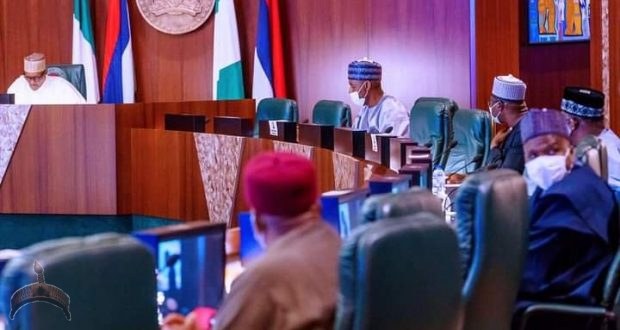The Nigeria Governors’ Forum (NGF) on Tuesday requested for a security bailout in view of the enormity of resources they expend in support of the military and police.
This was part of the governors’ submission anchored by their Chairman, Governor Kayode Fayemi of Ekiti State and Governor Babagana Zulum of Borno State, during a three-hour virtual meeting coordinated by President Muhammadu Buhari from the Council Chambers of the Presidential Villa, Abuja.
The meeting was attended by Vice President Yemi Osinbajo, heads of defence, security and intelligence agencies, and members of the Security Committee of the NGF, represented by one governor from each of the six geo-political zones.
The meeting focused on security policies and approaches in tackling the internal security challenges.
The governors highlighted the problems of poverty, unemployment, trust deficit between the military and civilian population and the inflow of small arms into the country.
The governors also pointed to the problem of coordination among military and security chiefs and played up their own security roles, which included one billion dollars they allowed President Buhari to withdraw from the Excess Crude Account for weapons procurement two years ago.
But the president did not respond to the request for bailout.
When contacted, the Senior Special Assistant to the President on Media and Publicity, Garba Shehu, told Daily Trust that the Chief of Staff to the President, Ibrahim Gambari, took note of the request and other issues discussed, and would later brief the president who would take an action on it at the appropriate time.
Representatives of civil society groups that spoke to Daily Trust last night said there was no need for the bailout request, adding that the money will be siphoned.
When contacted to react to the allegation, the Governors’ Forum spokesman, Abdulrazaque Bello-Barkindo, declined comments.
President queries security chiefs
The president, while speaking at the meeting, queried the security and intelligence chiefs over the ease with which terrorists and bandits’ accessed weapons.
He particularly voiced concern that despite the fact that borders with neighbouring countries had been shut, bandits and terrorists continued to have access to small weapons.
“These terrorists are in the localities. How is it that they are not short of small arms?” he queried the security and intelligence chiefs in a statement issued by his spokesman, Garba Shehu.
The president, however, dispelled the assumptions that the terrorists in the Northeast had far more weapons and money than the government, stressing that what is left of them are “mere scavengers desperate for food, raiding shops and markets, and killing innocent persons in the process.”
Buhari, who informed the governors of the imminent shipment of military weapons and aircraft from Jordan, China and the United States, again asked for patience on the part of the public because the new weapons and aircraft must be manned by trained fighters and pilots who must first receive appropriate training.
According to Buhari, “We have said enough on the need for them to rejig their operations. I am glad that there is better synergy and cooperation, which are very important.
“I have directed the Service Chiefs to meet among themselves in-between the National Security Council meetings.
“The services have resources; yes, they need more, and mobility, and are doing their best, but there is a need for better gathering and interpretation of intelligence. Our intelligence-gathering must be improved.”
Buhari, who expressed satisfaction with the level of support from neighbouring countries in the war against terrorism, restated that intelligence-gathering must improve to be able to track small arms in the Northwest, Northcentral and Northeast States.
“They are cooperating with us. On Boko Haram, we are making progress with Benin, Niger, Chad and Cameroon,” he said.
The president, who also expressed satisfaction with the level of Naval activity in the Gulf of Guinea, using newly-acquired equipment, requested that hard-to-reach areas of Lake Chad, where Boko Haram terrorists have found new havens, as well as the forests now inhabited by bandits, must be accessed and cleared of nefarious elements.
“The Chief of Defence Staff has spoken about their study of the forests and their potential danger to security.
“We must make sure we follow the bandits and terrorists, but there must not be deforestation in view of the climate situation,” he said.
At the end of the meeting, the president and governors called for a joint strategy to bring various conflicts to an end within time limit, while field commanders would take measures to protect civilian communities as a confidence-building mechanism between the military and those communities.
The meeting agreed that intelligence-gathering and sharing must be optimised for the nation to secure itself.
“It is hoped that when the trust that has been lost between both parties is re-established, there would be improved cooperation in intelligence-gathering and sharing,” the statement added.
The meeting also agreed that poverty and youth unemployment were at the root of the nationwide security challenges, and needed to be addressed with greater vigour by all tiers of government.
It would be recalled that the governors of the northeast met with the president on Monday over the insecurity situation.
‘Governors’ request plot to siphon funds’
Speaking on the matter, the Executive Director, Resource Centre for Human Rights and Civic Education (CHRICED), Dr Zikirullahi M. Ibrahim, said the calls by the governors for bailout to tackle insecurity were another attempt to siphon scarce national resources.
According to him, if the president obliges them, it will be most unfortunate.
“These are the same governors, who got bailout to pay workers’ salaries at the inception of this administration, but never did.
“The governors have been mismanaging security votes, which are being used as slush funds without any modicum of accountability.
“Even without accounting for funds collected in the name of security votes, they are requesting for more to tackle insecurity, which is one of the consequences of bad governance they have offered since Nigeria returned to democracy in 1999.
“Insecurity is the result of the terrible governance that has been on offer.
“The idea of state governors throwing money at the problem will not address it.
“Only good and participatory governance, driven by the welfare of the people can end insecurity in the land,” Ibrahim said.
On his part, the Executive Director, Civil Society Legislative Advocacy Centre (CISLAC)/Transparency International Nigeria (TI-Nigeria), Auwal Musa Rafsanjani, said it was an indirect vote-of- no-confidence passed by the governors over the endless insecurity in Nigeria.
According to him, this has confirmed the centre’s observations and demands for security reform in Nigeria, and that the president must take proactive measures to respond to the escalation of insecurity by embarking on a progressive reform to secure Nigerians.
“The request by the governors for bailout on security is not a sustainable solution. It will become another abuse of public funds like security votes, which funds are available for government officials at federal, state and local levels to spend at their discretion in the context of providing security.
“Going by the current practice in which security vote spending is not subject to legislative oversight or independent audit, it will only enhance corruption.
“Annually, security votes amount to N241bn, which is about $671m. This amount of N241bn exceeds 70 percent of the annual budget of the Nigerian Police. Also, the amount on security vote is nine times the amount the U.S. has given to Nigeria from 2012 till date, which stood at $68.6m and it is 12 times the $53.5 the amount the UK government has proposed to spend in Nigeria from 2016-2020,” Rafsanjani said.
 Ọmọ Oòduà Naija Gist | News From Nigeria | Entertainment gist Nigeria|Networking|News.. Visit for Nigeria breaking news , Nigerian Movies , Naija music , Jobs In Nigeria , Naija News , Nollywood, Gist and more
Ọmọ Oòduà Naija Gist | News From Nigeria | Entertainment gist Nigeria|Networking|News.. Visit for Nigeria breaking news , Nigerian Movies , Naija music , Jobs In Nigeria , Naija News , Nollywood, Gist and more









